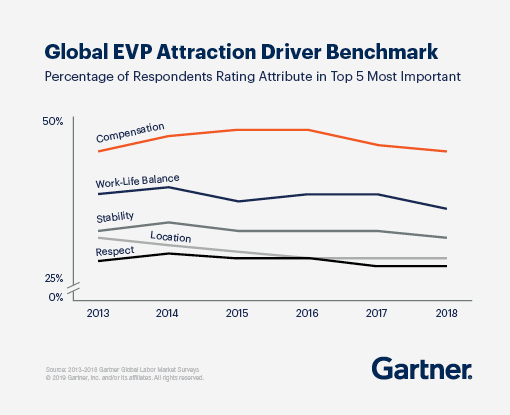Part of having a strong talent management program is creating a work environment people actively want to be a part of. When it comes to promoting the benefits of a company to the external workforce, we usually bring up words like employer brand or recruitment marketing. But there’s another term that’s been gaining traction of late, and that would be the employee value proposition.
Simply put, an employee value proposition — often just called EVP — is broadly about how current employees and the overall labor market perceive the value of working in that company. Think of some big examples right now: for years, Google had a tremendous EVP. It was almost synonymous with hyper-educated, experimental thinking and “moon shots.” The best of the best wanted to be there. That’s a strong EVP. Amazon is similar in many ways today: it’s a darling of disruption and has scaled itself in numerous industries from cloud to entertainment to online retail. The hours can be long in both white- and blue-collar jobs, yes, but many job-seekers would love the chance to put Amazon on their resume. That’s a strong EVP overall as well.
You don’t need to have billions of dollars to develop a strong EVP, though. You just need to think through a couple of key inputs. But what are they, exactly, and how can you use them to develop your own EVP?
What are the critical factors of a strong EVP?
Gartner offers the following insights:

What would those top 5 inputs look like for a mid-size or smaller organization?
- Make sure compensation is at or above market: When you say “market,” try to benchmark to the top of the local market instead of the median. If you can’t afford to pay that much, consider not hiring for certain roles at first (less essential roles) so that you can fund more for business-driving roles. Also consider additional perks that are akin to compensation, like learning credits or child care assistance, to balance a lower base salary. Be fair in this area. It is nearly impossible to have a strong EVP if you don’t pay well.
- Work-life balance: This has admittedly become a buzzword of late in many circles, but put the work above any politics or protocols. If the job is getting done but someone needs to leave early or be offsite for family reasons — but the work is still getting done — then it shouldn’t matter where that task is finished. Physical proximity is important to team development in many ways, but those needs can’t be above an employee’s need to manage their life outside of your walls. If you have a strong work-life balance approach, it’s been shown to be the third-most important strategic advantage a company can have.
- Stability: The job search process is not amazing for most people and many want to avoid it. In a work setting, “stability” means a sense that this job will continue to exist, there won’t be annual layoffs, careers can be long-term, etc. Yes, things happen in a business and downturns happen in economies. You cannot control for everything. But many people are looking for some stability from their primary job because they need that assurance to be able to plan for the next weeks, months, or years. Imagine trying to buy a house when you’re not sure if your job will exist in a year. Offer that stable environment with generally low turnover and you’ll be adding a strong component to your EVP.
- Location: Most companies have one or two main HQ areas, but try to be increasingly flexible on this. You want the best people to drive your organization forward. Oftentimes, the best person for a role might not live in the same city that your HQ is in. Telling them to move, especially if they are older and more established (kids in a school, etc.) can be tricky. So long as they know the processes for working on their team and they are accountable to the work, location should be flexible. This flexibility is actually a large part of the location side of the EVP.
- Respect: Over half of the global employee population apparently doesn’t feel respected by their bosses, and 60% of bosses in a 20,000-manager study said they “didn’t have the time” to respect their employees. Sad state of affairs there. Remember: businesses are built by the actions of people. You can’t force everyone to respect everyone else, but a culture of respect and attempted mutual understanding should be dominant in your organization. People don’t stay where they aren’t respected and that negative experience can taint your EVP, especially if it starts making the rounds on social media.
Read More: Check out these tips to build a strong employee experience
What are the less critical factors of an EVP?
If you nail the top five, you’d likely have a very strong EVP and quality referrals coming in. But there are other aspects to the picture, of course. Some of those include:
- Use a template for structuring EVP (here’s one example).
- Respond to both positive and negative Glassdoor reviews. Candidates will go on Glassdoor to learn more about your culture. If they see that you’re proactive about negative reviews, that can be beneficial to securing them. And remember, attacking bad reviews or faking positive ones are big red flags to candidates so be careful how you phrase your responses.
- Incorporate a one-paragraph version of the EVP — ideally touching on the five main factors above — at the bottom of all external job descriptions.
- Create a video that showcases elements of your EVP; perhaps even multiple videos.
- Have a “Culture” page on your website, or have “Culture” as a sub-site within “Careers.” Really show top candidates what it’s like to work there and how awesome it will be.
- Consider using a team-based interview model so that current team members can discuss the culture, the workload, the balance, etc. with candidates, as opposed to just the hiring manager for the role doing that.
Pro-tip: For best hiring results, connect candidate experience with employee experience
As hiring gets harder, EVPs will be requirements
Everyone wants to be seen as a great place to work because that means they’ll be able to attract top talent and quality referrals. Along with your employer brand and recruitment marketing efforts, your EVP is a crucial addition to your toolkit to promote that message. Instead of pushing a brand, your EVP should help candidates compare what life in your company would be like versus another offer. Hopefully, that message will be the information they need to tip their decision in your favour.
Now it’s true, it can be hard to pinpoint where to start work on your EVP so one idea is with employee surveys. Find out what your current staff think about the employee experience and employee engagement at your company and use that to guide your next actions. Maybe you need to spend some time on reviving company culture, for example, before you push your EVP public. Or maybe your employees are already in a positive place and all you need to do is frame your message. Wherever you start, it’s an important process to go through not only to make your recruitment activities more effective, but also to gain a better understanding into your current employees and their view of the company. When both the EVP and employee experience are positive, there’s no telling how far you can go.
{{cta(‘153e11eb-2b45-44a3-a901-dc441dc2c1df’)}}







